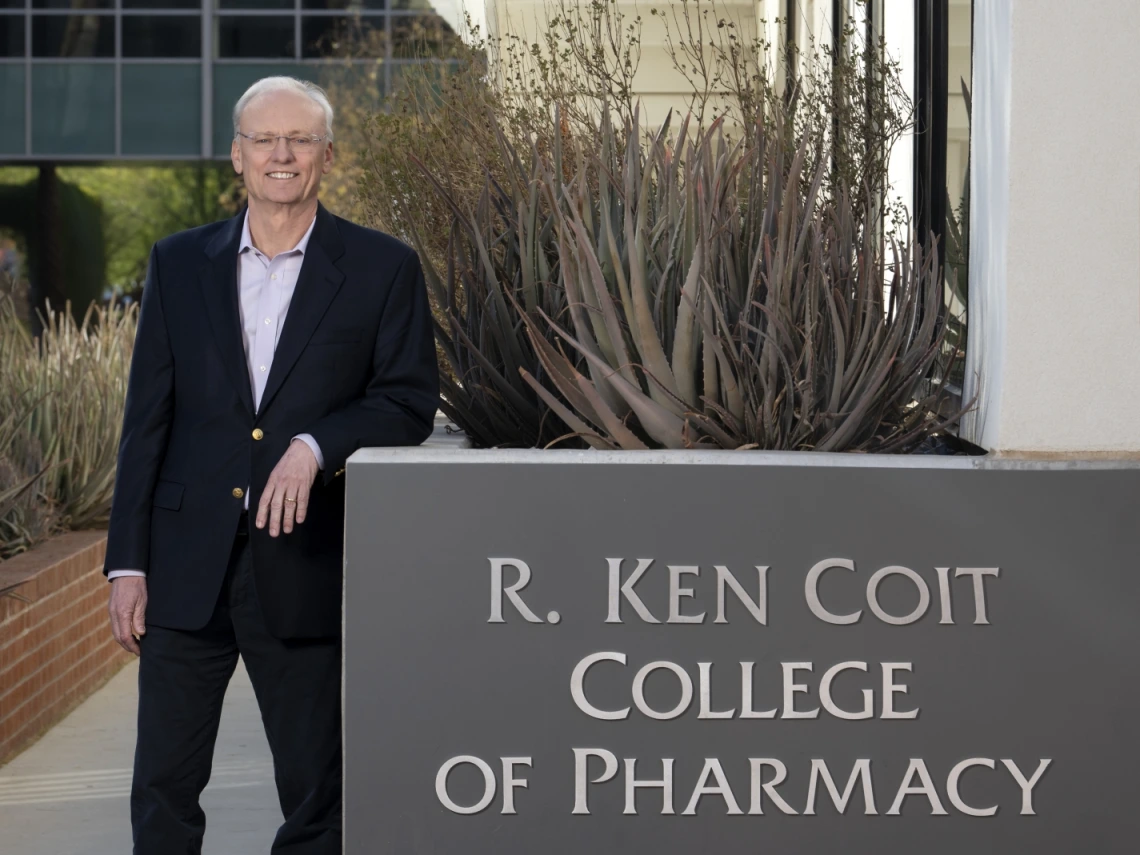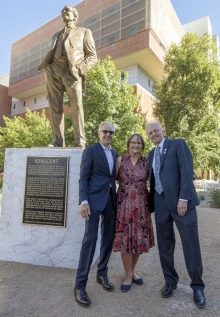Rick G. Schnellmann, a Transformational Dean with an Entrepreneurial Spirit, Steps Down After Nine Years

Dean Rick Schnellmann, PhD, has shared with Provost Prelock and President Garimella his decision to step down, effective June 30, 2025. He will return to his tenured faculty position in the Department of Pharmacology and Toxicology after a one-year research leave before resuming research in July 2026.
Schnellmann has significantly advanced the R. Ken Coit College of Pharmacy since his appointment in 2016. “After nearly a decade of service, I have achieved everything I set out to do and look forward to new challenges. I want to express my gratitude to everyone who has worked tirelessly alongside me to create a legacy of excellence as a springboard for future success. Our remarkable growth in research and the expansion of our educational mission have only been made possible through a shared vision,” says Schnellmann.
Provost Patricia Prelock shared, “Dr. Schnellmann’s tenure has also been marked by notable personal achievements. As Dr. Schnellmann returns to research and teaching, he will continue to make a profound impact in the field of pharmaceutical sciences through mentoring the next generation of pharmacists and scientists and advancing research that improves lives.”

Dean Schnellmann with R. Ken and Donna Coit.
During his tenure, the college’s trajectory was fundamentally reshaped. Through bold initiatives and efforts, the R. Ken Coit College of Pharmacy has risen to national prominence. Through his fundraising efforts, he raised over $106 million, an unprecedented achievement in the university’s history, enabling transformative investments in the people, programs, and physical spaces. It was through the generosity of R. Ken Coit that, in 2021, the college received a $50 million gift, the largest gift in the college’s history, which has continued to spark additional gifts totaling over $70 million and the creation of the Coit Museum of Pharmacy & Health Sciences.

Dean Schnellmann during the construction of the Skaggs building.
Through this commitment, the college more than doubled its national research funding—from $13 million in 2017 to over $27 million in 2024—placing it among the top four pharmacy schools in the nation in both AACP and Blue Ridge Institute rankings. The expansion of the centers of excellence, including the Arizona Center for Drug Discovery and the founding of the Coit Center for Longevity and Neurotherapeutics, formed powerful new interdisciplinary collaborations across the university and with industry partners. The number of endowed chairs grew from just two in 2017 to 12 in 2024, attracting some of the most visionary scientists and educators.
Launched just months into his deanship, he worked to complete the $26 million renovation and expansion of the Skaggs Pharmaceutical Sciences Center into a world-class research facility. There, he realigned the college’s research focus areas to drug discovery and development, environmental health and toxicology, and longevity and neurodegenerative diseases and Therapeutics.
Academically, pharmacy education was reenvisioned as more inclusive, innovative and interdisciplinary. PharmD class sizes at the Phoenix Biomedical Campus increased from 25 to 80 students from 2016 to 2024, groundbreaking dual-degree programs launched, and new undergraduate and graduate degrees were created and aligned with the evolving needs of healthcare. “I feel optimistic about the future of pharmacy, knowing we’ve prepared our students for success in an ever-changing industry,” says Schnellmann.

Dean Schnellmann talks with students at the End-of-Year Picnic.
“Most importantly, we’ve remained focused on the people and communities we serve. From our faculty and staff to our students, alumni and partners, this college is driven by purpose and impact. I am especially proud of our efforts to serve Arizona’s rural and underserved communities, and of the students who chose to stay and make a difference right here in our state,” says Schnellmann.
He continues, “Serving as dean has been one of the most rewarding experiences. Thank you for the opportunity to serve in this role, and I look forward to continuing my contributions as a member of our outstanding faculty.”
Schnellmann has been named a Fellow by the American Society for Pharmacology and Experimental Therapeutics (ASPET), received a Career Achievement Award from the Mechanisms Specialty Section of the Society of Toxicology, and the Investigator of the Year Award from the Southern Arizona Veterans Affairs Health Care System.
His research has been continuously funded since 1987 and focuses on mitochondrial dysfunction and the development of therapeutics for conditions such as acute kidney injury, diabetic kidney disease, stroke, and spinal cord injury. His work has brought about the founding of three spin-off biotechnology companies focused on drug discovery and development and has generated more than 250 peer-reviewed papers and more than 30 book chapters.

